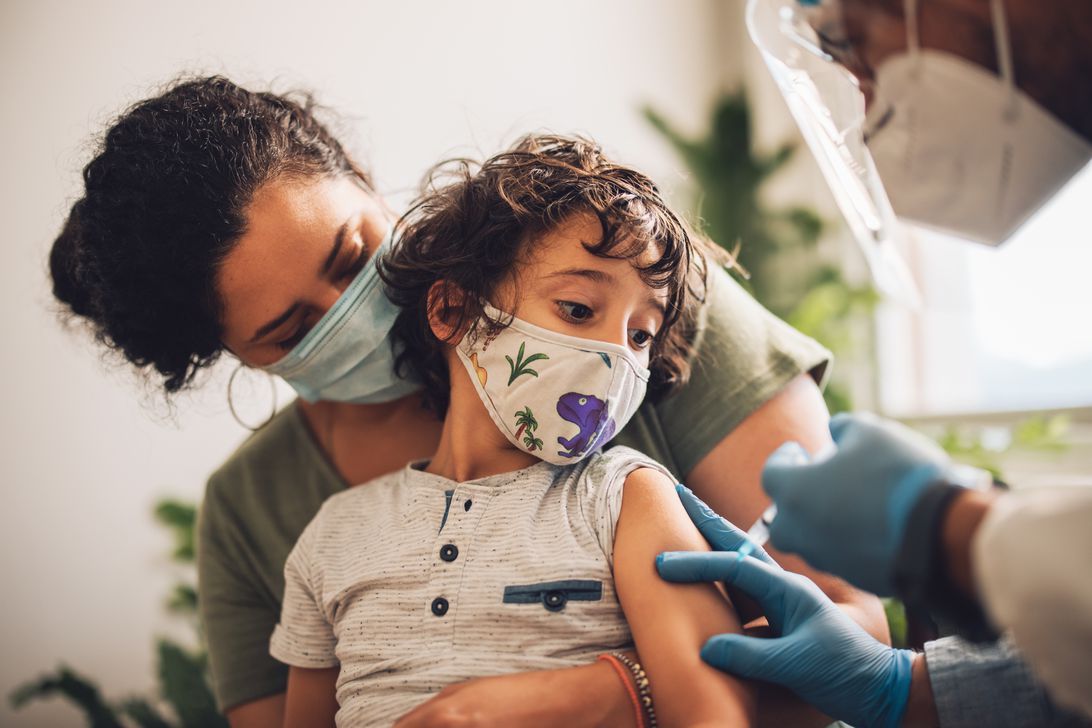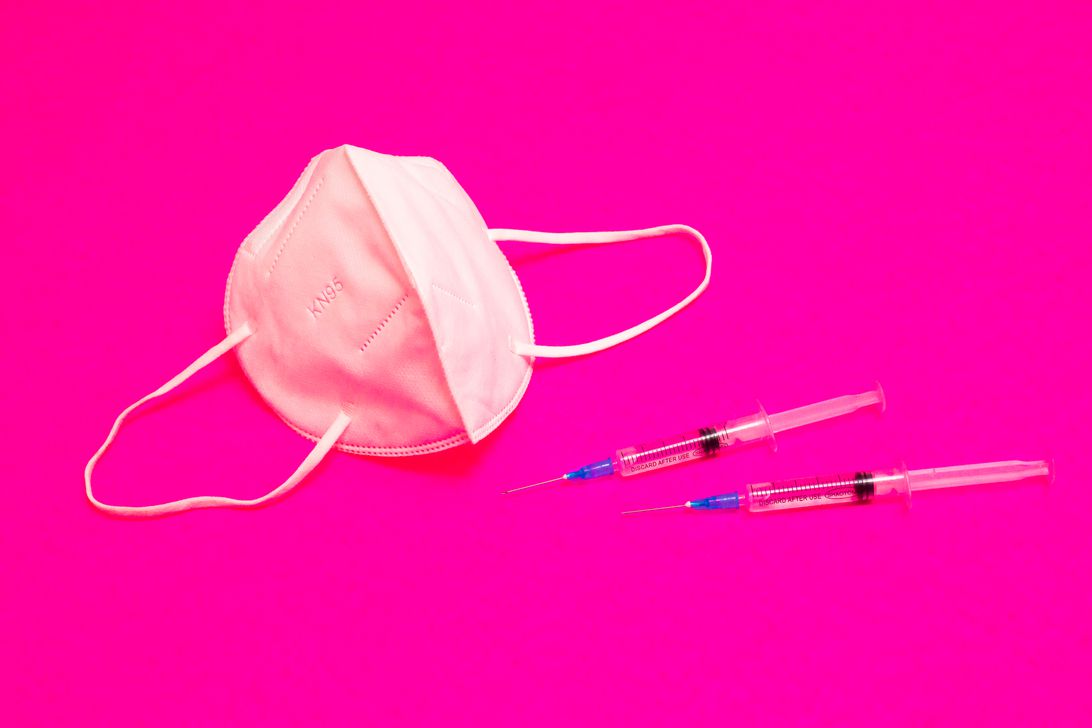
jacoblund/Getty Images
Kids age 12 and up can now get a booster shot of Pfizer’s COVID-19 vaccine after the US Centers for Disease Control and Prevention on Wednesday recommended COVID-19 boosters at least five months after their second shot for a larger age group. The CDC’s endorsement of the new guidance followed a vote by an independent committee that advises the agency. Typically, the panel of scientists meets to go over data on vaccine safety and effectiveness before shots are recommended to the public.
“This booster dose will provide optimized protection against COVID-19 and the Omicron variant,” CDC Director Dr. Rochelle Walensky said in a statement Wednesday. “I encourage all parents to keep their children up to date with CDC’s COVID-19 vaccine recommendations.”
Boosters have been available for everyone age 16 and up as health officials encourage extra doses as a way to maximize protection against COVID-19 disease caused by the omicron variant. As COVID-19 cases hit record numbers in the US, including in children, more efforts are being made to protect kids. Earlier this week, the CDC recommended third doses of Pfizer’s COVID-19 vaccine for children who are at least 5 years old and moderately or severely immunocompromised, which is in line with guidance for immunocompromised adults, and also shortened the time someone who got Pfizer’s vaccine needs to wait for a booster shot.
Pfizer-BioNTech’s vaccine is currently the only one authorized for children; due to lack of sufficient data, Moderna’s and Johnson & Johnson’s shots are still only authorized for adults age 18 and up.
Record-breaking numbers of COVID-19 cases in the US are leading to more children being hospitalized who are too young to get the COVID-19 vaccine. While children under age 5 can’t be vaccinated yet, Reuters reported that Pfizer could have results on its vaccine for kids in that age group by April.
As the COVID-19 landscape continues to move, here’s what we know about COVID-19 vaccines for kids. Plus, learn about the possibility of a fourth booster shot and how to find an at-home COVID-19 test.
Are booster shots safe for children?
In a statement following its authorization of booster doses for kids 12 to 15, the FDA said it reviewed real-world data from more than 6,300 children in Israel, ages 12 to 15, who received a booster shot at least five months after their second dose of Pfizer. No new safety concerns were reported to date in those individuals, the FDA said.
“These additional data enabled the FDA to reassess the benefits and risks of the use of a booster in the younger adolescent population in the setting of the current surge in COVID-19 cases,” the agency said. “The data shows there are no new safety concerns following a booster in this population.”
What side effects can children get from a COVID-19 vaccine or booster?
Vaccine side effects in kids ages 5 to 11 are mostly mild and similar to those adults may experience, according to the CDC, including soreness at the injection site, fever, muscle soreness, nausea and fatigue. In a Dec. 13 report from the agency, the CDC reviewed reports from safety monitoring systems on more than 8 million doses of Pfizer’s vaccine given to kids ages 5 to 11, confirming that children’s immune systems respond well to the vaccine with common mild side effects, and that serious adverse events are rarely reported.
Inflammation of the heart muscle, known as myocarditis, and of the muscle’s outer lining, called pericarditis, are rare and typically mild side effects linked to the Moderna and Pfizer vaccines, mostly in adolescent males and young men ages 12 to 29. (Myocarditis can also occur after infection with COVID-19.)
In one study, the CDC said that 54 recipients out of a million males ages 12 to 17 experienced myocarditis following the second dose of Pfizer-BioNTech’s Comirnaty vaccine. In contrast, kids ages 5 to 11 who catch COVID-19 have a higher risk of multisystem inflammatory syndrome, or MIS-C, a potentially serious complication involving inflammation of the heart, lungs, kidneys, brain, skin, eyes or other organs.
“The bottom line is that getting COVID is much riskier to the heart than anything in this vaccine, no matter what age or sex you are,” Dr. Matthew Oster, a pediatric cardiologist at Children’s Healthcare of Atlanta, told the CDC in November, ABC News reported.
When can my kid get a booster shot?
Kids as young as 12 can now get a COVID-19 booster of Pfizer’s vaccine, at least five months after their second shot. Kids younger than 12 can’t get a booster, though children who are immunocompromised and at least 5 years old, which includes kids who’ve had organ transplants, can get a third dose of Pfizer’s vaccine 28 days after their second dose.
Where can my kid get a booster shot?
Since only Pfizer’s COVID-19 vaccine is approved for anyone under 18, it’s generally just available in doctor’s offices, public health clinics and other places accessible to children. (Mass vaccination sites that provide COVID-19 shots to adults are not part of the child vaccine program.)
Call your pediatrician or local health clinic for a recommendation on where to go. Parents may also text their ZIP code to 438829 or use this vaccine finder link to find a clinic near them that has the child vaccine available.
Can children age 4 or younger get a COVID-19 vaccine?
Not yet. White House medical advisor Dr. Anthony Fauci previously said that he expects vaccines to be available to children under 5 by early 2022. On Dec. 17, Pfizer announced that it will be testing a third-dose protocol with children as young as 6 months old. A two-dose series of a 3-microgram version of Pfizer’s vaccine proved effective in children 6 to 24 months, but not with 2-to-5-year-olds. Results from a vaccine trial for kids under 5 could be available by the end of March or early April, Reuters reported. If the results prove effective, it will open the FDA authorization door for COVID-19 vaccines for kids under 5.
In December the FDA authorized Eli Lilly’s monoclonal antibody treatment for young children, even newborns, if they’re infected or were exposed and are at high risk of severe COVID-19. Children who are at high risk for COVID-19 include kids who are obese or have diabetes, asthma or other health conditions.
However, monoclonal antibodies are understood to be not as effective against treating COVID-19 when caused by the omicron variant.
Do young kids need a COVID-19 vaccine?
According to a Jan. 4 report from the American Academy of Pediatrics, COVID-19 cases in children have reached their highest case count since the beginning of the pandemic. Nearly 7.9 million children have tested positive for COVID-19 since the beginning of the pandemic, or one in 10 children, the AAP reported. (The AAP reports that the definition of “child” varies by the states reporting.)
Children do typically remain at low risk of severe COVID-19 disease and death compared with the adult population but kids can experience distressing and dangerous complications from COVID-19, including long COVID and MIS-C.
There are also racial disparities in how sick children get from COVID-19: Kids ages 5 to 11 who are Black, Native American or Hispanic are three times more likely to be hospitalized with COVID-19 than white children, according to an FDA advisory panel. Of that group, about one in three will require admission to the ICU.
How is Pfizer’s child vaccine for kids under 12 different?
Though it’s still delivered in two shots given three weeks apart, Pfizer’s vaccine for kids 5 to 11 is one-third the dose given to everyone 12 and up. Pfizer’s vaccine for kids can also be stored for up to 10 weeks in a fridge, making it easier to administer, and the cap on the vial is orange instead of purple and gray to avoid mix-ups.
And if it helps to put your kids at ease, the needle used to administer the child’s dose of vaccine is also smaller.
For more information about Pfizer’s vaccine for younger children, check out this fact sheet by the FDA.

Sarah Tew/CNET
Do I need to give consent for my young child to get vaccinated?
Yes, parents generally need to consent to their children receiving medical care, including Pfizer’s COVID-19 vaccine. This is especially true for younger children.
However, depending on which state you live in, there may be a legal precedent for teens and other kids to request the vaccine without your permission: Tennessee’s vaccine director, Michelle Fiscus, was fired in August, allegedly in part for sending out a memo detailing Tennessee’s “mature minor doctrine,” which explains how minors may seek medical care without the consent of their parents.
If my child has a serious health condition, can they get a third shot?
On Tuesday, the CDC recommended a third dose for children as young as 5 who are “moderately to severely” immunocompromised, 28 days after their second shot. This guidance for immunocompromised children (including kids who’ve had an organ transplant or are taking medications that suppress the immune system) is in line with guidance for adults whose bodies don’t mount a good immune response to the COVID-19 vaccines.
My child has allergies. Can they get the vaccine?
Yes, though you might be asked to stick around the waiting room so health care providers can monitor them for (extremely rare) allergic reactions that can occur after any vaccination.
“If the child has a history of anaphylaxis or other severe allergies, then the observation time after the injection may be 30 minutes instead of 15,” said Dr. Anne Liu, an infectious disease specialist with Stanford Hospital and Clinics and the Lucile Packard Children’s Hospital. Children who have been prescribed an EpiPen for any reason should bring it to their vaccine appointment, Liu added.
As with adults, children with an allergy to an ingredient in Pfizer’s COVID-19 shouldn’t take it. You can find a list of ingredients in Pfizer’s vaccine for kids ages 5 to 11 on the FDA’s fact sheet.
Can my child get the COVID-19 shot at the same time as other vaccines?
According to the CDC, your child may get other vaccines when they go in for their COVID shot without waiting 14 days between appointments. Flu shots can be given to children ages 6 months and older.
The information contained in this article is for educational and informational purposes only and is not intended as health or medical advice. Always consult a physician or other qualified health provider regarding any questions you may have about a medical condition or health objectives.